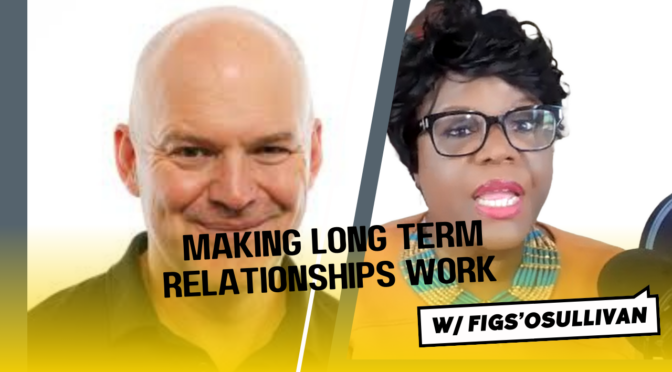About The Guest Bio
Figs O'Sullivan is a licensed marriage and family therapist, certified in emotionally focused therapy and the founder of Empathi. He is passionate about helping couples create happy and healthy relationships and has spent years working with couples at crossroads in their relationships. Figs combines his background in attachment theory, improvisational dance and theater, and experimental psychotherapy to provide effective and simple solutions for couples.
Sponsored Ad

Shopify is the commerce platform revolutionizing millions of businesses worldwide.
“What I love about Shopify is how, no matter how big you want to grow, Shopify gives you everything you need to take control and take your business to the next level.”
- Sign up for a one-dollar-per-month trial period at SHOPIFY.COM/transform .
Summary Keys to Making Long-Term Relationships Work:
In this episode, Figs O'Sullivan, a licensed marriage and family therapist, shares his expertise on how to make long-term relationships work. He explains that the key to a successful relationship is to shift from a perspective of blame and criticism to one of empathy and understanding. Figs emphasizes the importance of recognizing that both partners are hurting and that their actions are a result of their own pain.
He also discusses the three common patterns of conflict in relationships and how to break free from them. Figs provides practical advice on how to create a connection vacuum and foster a deeper emotional bond with your partner. He concludes by highlighting the transformative power of empathy and the importance of experiencing it in order to create lasting change in a relationship.
Key Takeaways:
- Shift from blame and criticism to empathy and understanding in your relationship.
- Recognize that both partners are hurting and their actions are a result of their own pain.
- Break free from the three common patterns of conflict in relationships: protest polka, mutual criticism, and silent suffering.
- Create a connection vacuum by sharing your feelings and needs with your partner in a vulnerable and non-blaming way.
- Foster a deeper, emotional bonding, with your partner by experiencing empathy and understanding for each other's pain.
Sponsored Ad

The Coffee with Karina Podcast is a captivating and informative show hosted by actress/producer Karina Michel, where she engages in meaningful conversations with a diverse range of guests. Each episode delves into various topics, including personal growth, professional development, and lifestyle.
So grab a coffee and get behind the scenes with Karina…
Shifting your perspective in long-term relationships
Myrna: Enjoying being together and actually liking each other again because yeah, so it's very rewarding. It's almost like me when I help clients. As far as coaching, one of my biggest things in coaching is change the way you think of a thing and the thing you think of will change or look at the thing. So in coaching is all about changing your perception of something. And I love it when I'm able to do that for clients.
Figs: Huge. Absolutely. By the way. Exact same. The first hurdle is shifting people's perspective on what's happening between the two of them. And this is at the most basic level, right. When a couple comes to see me. They have two different perspectives of what's happening. And most of the time, not always, those two perspectives could be summed up as one person's perspective is the other person is messing up and they need to change some stuff to make things better. And then, of course, the other person is like, their partner spouse is like, thank you very much for that opinion because actually, funnily enough, I think you're the one messing up and you need to change a few things.
Yeah. And so some of them say that very politely, and others throw lethal weapons at each other right from across the room. And then my job is to actually craft seed the perspective of the entire system of both of them together and share that perspective with them in a way that helps them see the truth of, oh, would you look at this is who we are together as a system and that we both actually make sense. Both of us are right.
Both of us are getting hurt, and both of us act in ways that actually really do hurt the other person. And when they can then live deeply inside of that perspective, then their limbic systems, their nervous systems calm down. Right? They're not actually living with, like, a crocodile and a stone. They're actually two little kittens or two little puppies that are just herding and then we can start snuggling.

Why couples have the same fight over and over again
Myrna: Yes, I love that. Like I said, I can see it. And a lot of times they don't even want to go to therapy because the relationship is that bad, or saying, hey, now, exactly, we're just going to chuck this thing. But it's a good thing to do therapy. At least it means that you're willing to change. You're willing to see someone else's opinion. You're willing to see it from the other person's perspective.
And you start off by saying that your childhood was in a relationship where your dad was an alcoholic and your mom was heartbroken because of it, and then you were hurt because you're in this whatever. So what was that experience like for you? Did you see your parents fight? Because one of the things that you talk about is you help couples to not have the same fight over and over again. So how can you bring that into your personal experience?
Figs: Yeah, well, look, I witness my parents being together and fighting. I witnessed them being apart, right. And just fighting. Silence and just pain and sadness in the distance, the silence, not naming what's going on. You could think there's three ways people do the waltz of pain. The walls of pain is when two people that love each other are disconnected from each other and they both see each other as the withholder of love.
But there's basically three patterns in, long term relationships. One is one person's feeling abandoned, not prioritized. And they blame and criticize even they may not think they're blaming and criticizing. They may think they're just giving amazing advice to their partner that will really help them, but that's not how it lands. And of course, it makes their partner or spouse feel really bad about themselves, feel like they're unacceptable, they're never good enough. And so they pull away or withdraw or they defend themselves, right? And that's technically called an emotionally focused, couples therapy.

What happens when couples are both criticizing each other
That is called a protest polka. One person is protesting, Why aren't you here for me? And the other person's pulling away. The other way people do it is both of them are saying, Why aren't you here for me? They're both criticizing each other, right? Fireworks. I need a helmet and a shield when I'm sitting with them and they're going at it. Right. And then, of course, the third way, which a lot of people think at first this is actually healthy or good, is they're both hurting, feeling unloved, but they just don't talk about it.
But in the long run, it ends up in the same painful place that they've lost each other and they're in agony inside, but they just avoid ever. And inside, no matter which one of those three things and you might do all three in a day, or you may have one preferred, one that you do in your own relationship, right. But left unattended to that kind of system that is happening in a relationship and it doesn't get resolved. Right. It creates a connection vacuum that bad things can happen.
Right. So we just want to minimize the amount of time there is a connection vacuum in, long term relationships, so that we limit the chances of affairs or turning to work for your needs to be met so that you actually end up being able to turn to each other and be there for each other.
What to do if you are feeling unloved in a long-term relationship
Myrna: All right. I got tons of circle back on that one. So, yes, I can identify with all three of what basically you're saying, but not necessarily the middle one, but women are. And I've been in, long term relationships, where, yeah, you're saying, hey, I feel unloved. You're not showing me love. I don't feel love. I don't feel special. You're always working. You're always doing that or whatever. And then when you are correct, when you say it, the person goes into defense, but then you're saying the third one is that you don't say it. So in your experience, which one of those patterns leads to success down the road?
Figs: None of them. Right? That's the point. So here's the thing. So each one of those patterns, from the subjective experience, it makes sense from your individual experience inside a relationship, when I'm hurting, it makes sense to protest you're not loving me. Or let's say that's one. When I'm hurting, it makes sense to say nothing or defend myself. It makes sense from your individual perspective. When I'm hurting, I say nothing.
They all make rational sense to do for an individual member of a, long term relationship. But in the long run, even though it makes logical sense, it's going to make things worse for you, definitely. Right? Do you think you have a can of water in your hand and you're about to throw this can of water on the fire of the disconnection between the two of you? But the can was mislabeled. There is gasoline inside the can.
Because just think about it. Despite what you think, if you are in a, long term relationship, your spouse or partner loves you. They love you. You are the most important person in the world to them right now. When you're hurting and feeling unloved and you tell them you're not loving me, here's what they hear, right? Even if you think they look like they don't care, they just change the channel. They change the channel. They look like they don't care because that's how they survive. Feeling.

We all need to feel we are enough
I am devastated inside to be not enough again. The person I most want to be enough for is telling me once again I am a disappointment. I'm not good enough. I'm a failure. And it hurts so much. They have to avoid feeling it or defend themselves, whatever they do, like, change the channel. That's how they survive. But then, of course, you hear their defense or their channel changing, or they're like shutting down completely as evidence. See, I was right.
They don't love me. And so now, your own subjective experience, you're going to go, I'm going to reach for a second can of water and tell them even more how unloving they are, which will devastate them even more. And so they'll reach for their second can of water. I'll defend myself even more. It'll devastate you. And now you're both throwing cans of gasoline at each other, and you both feel totally justified in doing it. Now, here's the way out.
Figs: So just imagine for a moment your spouse, they're just really little. They're just a little kid inside, no matter how big and tough they look to you, right? They're just little, which they are when it comes to love. And they're heard they want more than anything to be good enough for you. And you tell them, you go, hey, you just did your homework. You got five out of ten. This is not good enough. I need you to do better at your homework. I told you yesterday, I told you the day before that.
When are you going to get better at homework? When I have pretty understandable expectations that you would be getting eight out of tens. And until you're getting eight out of tens, you go to your room, young man. Now, listen, I don't know about you, and listen, if that's your gig. That's how you think you motivate people, not just you, right. But listeners. Right. You go for it. But I don't think it works with most people.
They will defend themselves. They will collapse. They will give. I ain't doing no homework anymore. That's the end of me doing homework for you. I'm off to watch American football every Sunday on the couch. What's the point in trying to do homework for that one? No way. So, no, I don't ask them to meet the needs of their partner. I help them both understand.

Why couples should never tell each other what they are not doing
Listen, to be on the receiving end of what you do when you're hurting is devastating now. But by the way, I will help him in this example, right? I will help him see how devastating it is for you, right? Lord of woman, in this example, to be on the receiving end of how you survive when you feel there's no way to be good enough, when you don't try and show up, when you defend yourself, when they're genuinely validly hurting inside, it is devastating to be on the receiving end of that strategy to survive again, punchline.
Myrna: Wow. I love it. I learned so much from there. I will, definitely, because I'm one of those ones that tell my husband what he's not doing.
Yeah. And you call your company Empathi. So you're teaching your clients to have empathy for each other. I think that's what you say, how you help couples in, couples therapy, to get to a place of empathy. So is the place of empathy what we're talking now, or does it go deeper?
Figs: Yeah, so empathy is like the pivotal. Like, let's say empathy, let's call it on the journey. The hardest place to get to is where empathy is possible. Right? There's this threshold of revelation, right? And the threshold of revelation is, let's say we go from the two separate stories. You're the troublemaker in the relationship. Oh, yeah. No, you are. To, hey, it's both of us, and it's only happening because we love each other. And then it changes our physiology, it helps our nervous system and limbic system relax. And then we see, wow, we're both hurting.
Now we're having not only one way empathy. I'm empathizing with you or you're empathizing with me. We have what I call these days empathy squared. We're both feeling empathy for ourselves and each other at the same moment. So we want to have an empathy squared experience. It literally up levels a human being. Like, it literally is like going from being a two dimensional being to a three dimensional being.

Long-term relationships need empathy to survive
I'm hurting, you're hurting. And we both care about the way we're both hurting. And we both see the way we both hurt each other all at the same time. That's the experience. That's an empathy squared experience. We got to have that. If we have that now, like I was saying, now we can do all the deep repairs of the hurts in the past. We can love each other, we can work on our sex life, we can work on, like, so what are we going to do about the way we both spend money differently?
But that empathy squared experience is the pivotal. That's the pivotal first big transformational moment in the journey. And I always say it sucks that if couples are to fail, we fail to get to that empathy squared moment, because one or both people are like, yeah, whatever. They're still not there for me. They just can't get out of their own way. Not because they're bad, because they got hurt so much in the past that it's too scary to become unguarded undefended for a moment and have that present moment transformational experience.
Conclusion
Myrna: I love that. Tell us about your coaching programs. How can the listeners connect with you? Because yeah, this is good stuff.
Figs: Great. Yeah. So, look, all we do is try and help people love themselves and each other. Right. Any different way we can do it? We do counseling, coaching all over the world. And we have courses, we have a podcast, we write articles. Because your listeners are obviously into podcasts, you might want to check out our Come Here to Me podcast. And in that podcast, my wife and I actually share our own journey as people, couples, therapists that are being a couple and talking about their own emotional journey together as a couple.
So, as we say, relationship experts walk the talk. I just love sharing about the wisdom. And then the website is just www.empathi.com.
Additional Resources

